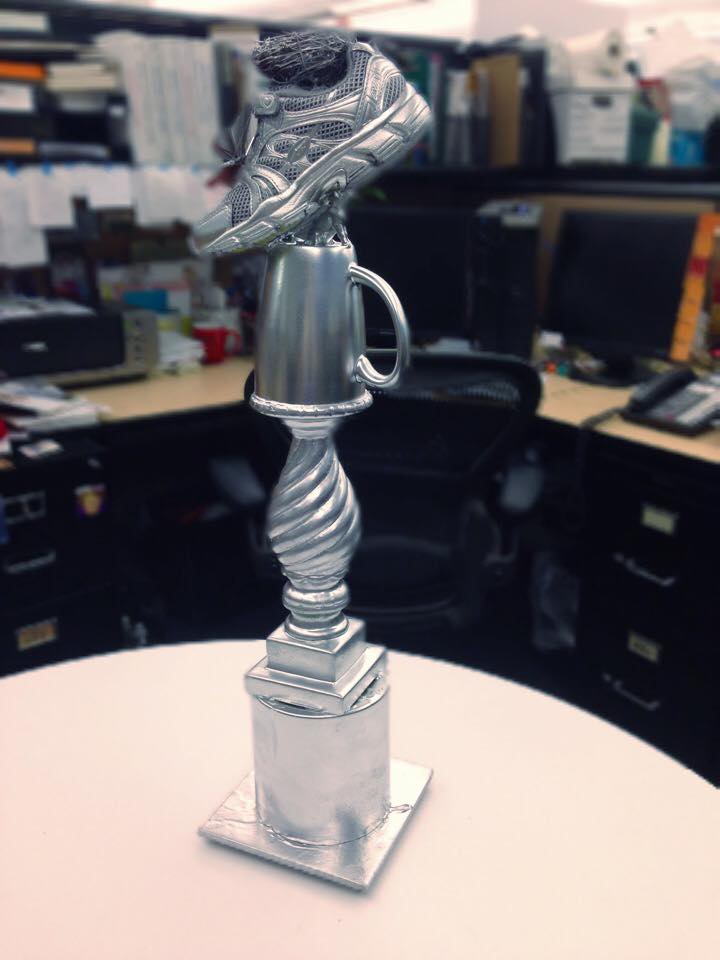
It started one spring with just two employees, one a young new hire, the other an older associate. “Is that a Fitbit you’re wearing? Do you want to walk?” All summer the two walked three-mile circuits of the office park over lunch and did laps in the building corridors on rainy days. That fall they walked the entire coast of New Hampshire, 22 miles, just because they could. The data charts and pop-ups of encouragement from the smartphone app became oddly addicting. Other employees were intrigued.
Over the winter, the activity tracker phenomenon grew. The following spring, a dozen employees were sporting trackers. Colorful bracelets, discreet clip-ons, were seen on walkers everywhere.
One principal, a fifty-something man with a family history of weight issues triggering health problems, looked at the trackers and shrugged it off. “My phone has a built in activity tracker. I’m all set.”
An architect with a new Fitbit was noodling around the Fitbit phone app. “What’s this Workweek Hustle?” It was a special challenge, new from the folks at Fitbit, a competition that allows Fitbitters to compete Monday through Friday using a nifty smartphone app. The leader board displays everyone’s progress in real time, a winner is declared on Friday night, then the slate is wiped clean and a new competition begins the next week.
The architect signed on and invited other office walkers to sign on too. A bit of competition might be fun. Within weeks it escalated. Some went off the charts with mileage. A husband and wife duo competed behind the scenes: “I poured her extra wine at dinner, she fell asleep early, I took the dogs out for a late night walk and crushed her step count.”
Remember the principal who scoffed at the trackers? About this time, he had a medical checkup and left with sobering news, “You’re diabetic. I’m putting you on metformin, a diabetes medication that helps control blood sugar levels, and you need to lose weight.” His glucose reading was 220 mg/dl, the healthy goal is under 100 mg/dl. He was pissed, and committed to changing his prognosis.
The next week the Fitbit-scoffing principal was sporting the fanciest of all Fitbit trackers and signed on to the challenge. The tone of the competition changed. We were all walking for fun. This guy was walking to save his health, his life. He walked every lunch hour. He walked an hour, sometimes two, again in the evening. He raised the bar high, pushing the rest of the competitors to new levels. The weather was turning into perfect New Hampshire spring and step counts were climbing to never-seen-before levels. Forty-five miles in five days, 90,000+ steps? No problem.
The group joked that the competition needed a trophy. With a budget of zero, a trophy was crafted from office cast-offs. It was a beauty, and moved every Monday morning to the new winner, as coveted as the Stanley Cup.
Weeks went by, step counts continued to rise. Participants took recovery weeks when over-worked knees and shins became balky. New, better walking shoes appeared. Water bottles were added as accessories. Some walkers were hitting the streets at 5:30 in the morning, others added after dinner strolls. Some lost weight, some firmed up and everyone felt better. The trophy moved around the office every Monday. Each week, it seemed, someone different stepped up and walked and walked and walked. Step counts of over 100,000 in five days became the norm. The real-time leader board became a lie-detector of accountability.
Back to the newly-diabetic principal. Once he hit his stride, he won the trophy more weeks than anyone else. He became fiercely competitive, frustrated when someone trumped his step count at the last minute. But his real win was much more important than the trophy. Coupled with changes in his diet, the exercise was improving his health. His weight was steadily dropping. Four months into his walking frenzy he had lost over 50 pounds and his glucose dropped to a healthy 80 mg/dl. A three-month hemoglobin check showed no signs of diabetes. The metformin prescription was history.
Six months later the competition continues. The participants morph a bit from week to week. So far, the changes to our all too sedentary lifestyle seem to be sticking. It took the motivation of an entire office to help change one employee’s long-term health prognosis, but in the end, we’re all winners at this game.
Anne Weidman is JSA’s marketing guru. Her latest initiative is Access Portsmouth, taking the mystery out of accessibility in historic Portsmouth.


